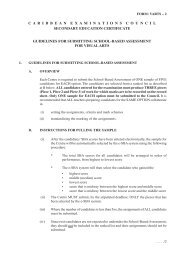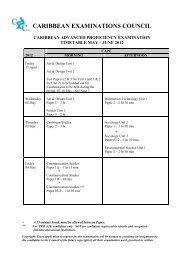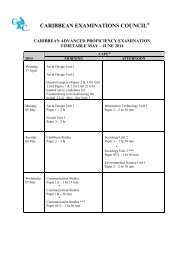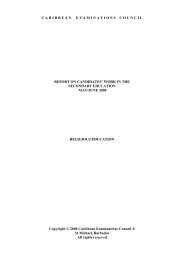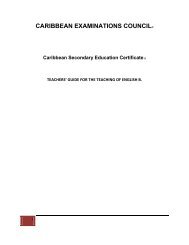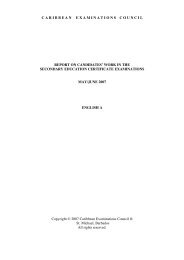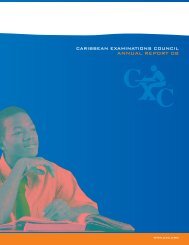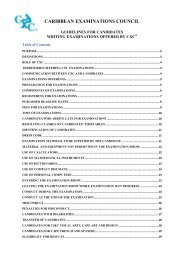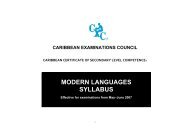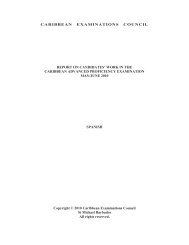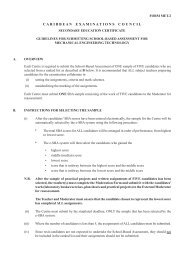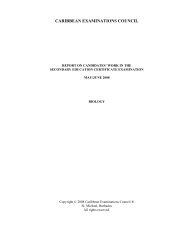CXC Examiner May 2012 - Caribbean Examinations Council
CXC Examiner May 2012 - Caribbean Examinations Council
CXC Examiner May 2012 - Caribbean Examinations Council
Create successful ePaper yourself
Turn your PDF publications into a flip-book with our unique Google optimized e-Paper software.
The <strong>Caribbean</strong> <strong>Examiner</strong><strong>CXC</strong> offered its first examinations in 1979 for the <strong>Caribbean</strong> Secondary Education Certificate,CSEC, commonly called <strong>CXC</strong>s by most people. Thirty-three years later, <strong>CXC</strong> offers a suite offive qualifications: CAPE, CSEC, CVQ, CCSLC and CPEA. This section looks at each of thequalifications.CAPE®The Post-SecondaryAdvantageBy Cherryl StephensThrough the <strong>Caribbean</strong> AdvancedProficiency Examination (CAPE), the <strong>Caribbean</strong><strong>Examinations</strong> <strong>Council</strong> (<strong>CXC</strong>) and its stakeholdershave created a post-secondary system thatis seamless, inclusive, democratic, sociallyresponsible, developmentally focused andinternationally recognised.By 1979, the Chairman of <strong>Council</strong> confirmedthat the <strong>Caribbean</strong> Secondary EducationCertificate (CSEC) had been successfullylaunched and that the time had come for <strong>CXC</strong>to lead the region in creating an alternative to theA’ Level examination. This would complete thedismantling of the colonial system of educationin the region. <strong>Caribbean</strong> education would thenbe owned and controlled from pre-school touniversity, by <strong>Caribbean</strong> people.By 1988, through an extensive process ofcollaboration between <strong>CXC</strong> staff, representativesof The University of the West Indies, othertertiary institutions and ministries of education,the central concept of the CAPE framework wasdeveloped.It was clear from the very beginning thatthe <strong>Council</strong> was not just about to replace oneexamination (Cambridge or London) withanother examination (<strong>Caribbean</strong>). It was to bea new developmental model which emphasisedpost ‘O’ level certification rather than replicating‘A’ level examinations in the <strong>Caribbean</strong>. Thesocial, cultural and economic benefits to theregion and its communities were to be substantial.It would give the <strong>Caribbean</strong> an enormous socialand economic advantage in a knowledge-basedsociety in which a post-secondary educationhad become essential for the vast majority ofindividuals and should be everyone’s birthright.To seize this opportunity would require change;indeed, some significant changes. <strong>CXC</strong> created anintegrated, student-focused system that offeredstudents a fully integrated, seamless systemthat was accessible, inclusive, affordable, and ofhigh quality. This system afforded students withvaluable academic experience to gain access tomost colleges and universities.The new post-secondary system thatemerged has turned out to be a truly integratedsystem, with strong co-ordination mechanismto avoid unnecessary duplication and to ensureresources are used efficiently. In reality, it isa system that provides the <strong>Caribbean</strong> with astrategic advantage in the area of post-secondaryeducation.Indeed, the <strong>Council</strong> was able to break newground on the education landscape of the world.CAPE emerged as a regional examination withfull equivalence in standard to the ‘Advanced’ levelexaminations but was different in philosophy andstructure. It encompassed current arrangementsin sixth forms and articulated with programmesof community colleges and universities acrossthe region. It brought together academic, andtechnical and vocational courses of study withina single system of certification. The targetpopulation for the CAPE included persons whorequired certification for entry to regional andinternational universities, the job market andcertain professions with specific pre-requisites.It catered to mature and part-time students whowished to further their education or acquiremarketable skills, as well as persons seekingto benefit from opportunities for continuingeducation and personal development.CAPE is accessible and flexible and offerscertification for diverse populations with differentdestinations. This means that every <strong>Caribbean</strong>citizen has the opportunity to pursue learningin the field of his or her choice, consistent withthe needs and opportunities available within the8 MAY <strong>2012</strong> www.cxc.org




